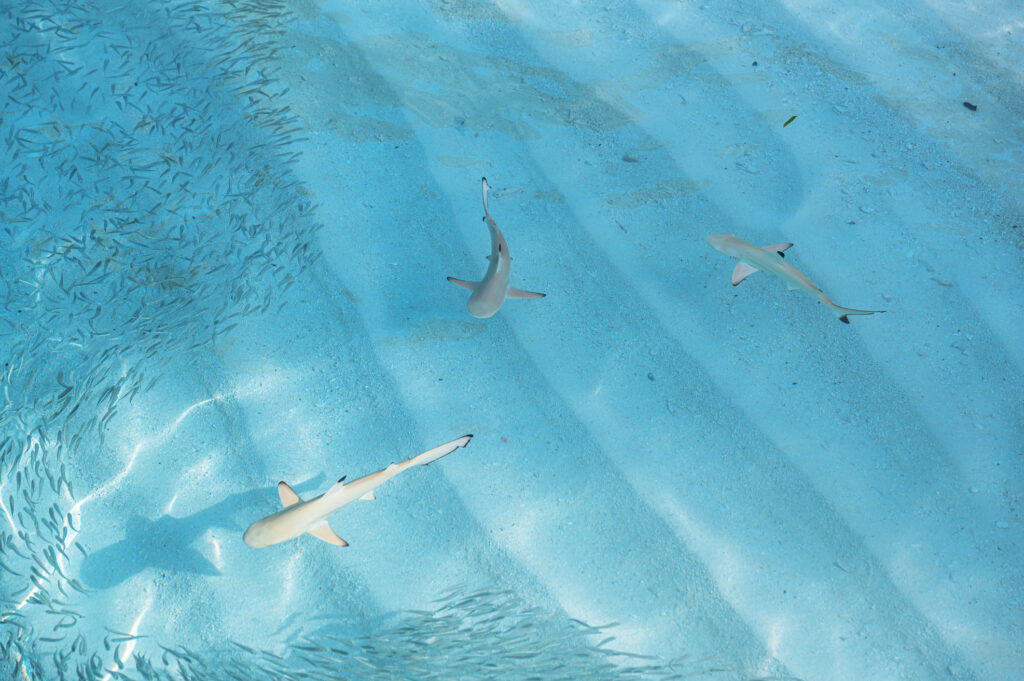Sharks are an incredibly ancient species that have been around for millions of years, even outliving the dinosaurs and placing themselves as one of the most important species within the planet’s ecosystem. But scientists have reported a drastic drop in their population in just the last generation.
If you’re thinking “how can these ferocious apex predators possibly go extinct?”, you’ve come to the right place – because we’re answering all your burning questions in this blog post. Before we get onto why, let’s get a few things straight…
Are sharks endangered?
In short – yes, the majority of sharks are classified as endangered. This simply means that their populations are decreasing, and they’re at high risk of extinction. According to the IUCN (International Union for Conservation of Nature), some are also vulnerable, meaning they’re in danger of extinction without human intervention. A growing number of shark species are critically endangered, which is the last classification before extinction.
Very few sharks have increasing populations, which can threaten the ecosystem and food chain across the world’s oceans, rivers and seas.
What are the most vulnerable shark species?
Shark reproduction, even at its best, can’t keep pace with shark deaths. According to the IUCN, the list of endangered shark species is surprisingly long; among approximately 470 species of sharks, 2.4% are listed as ‘Critically Endangered’, 3.2% ‘Endangered’, 10.3% ‘Vulnerable’, and 14.4% ‘Near Threatened’.
Some species classified as critically endangered include the Borneo shark (Carcharhinus borneensis), smalltail shark (Carcharhinus porosus) and daggernose shark (Isogomphodon oxyrhynchus).
It’s important to note that each assessed animal on the IUCN might have been categorised in different years, but with their assessment efforts, most are recent.
So why are they endangered?

Predators, but also prey: sharks’ troubles run deep. Sharks are endangered, and a lot of factors contribute to the decrease in their populations. Sadly, almost all are caused by human activities, but the good news is that these impacts can be stopped before it’s too late.
They aren’t necessarily threatened by the usual culprits other marine and land mammals can be affected by. Habitat destruction is far less common since many sharks can survive in a range of habitats around the world. The same goes for the effects of climate change. Plenty of sharks thrive in warmer climates, so the rising sea temperatures aren’t a big issue.
Instead, one of the threats many shark species are facing is fishing pressure from those who slaughter them only for their fins. In countries like China, shark fins can be used as medicinal products, while in Japan, they’re a common delicacy. This fishing industry is also a lucrative export business, with shark fins being sent to various other countries for human consumption. Reports indicate that up to 73 million sharks are killed each year solely for this purpose – a truly shocking stat!
Why should we care?
Let’s be honest, sharks don’t tend to have the best reputation among humans. These beautiful and elegant creatures of the sea are commonly assumed to be dangerous man-eaters, and not enough people really care about their conservation; in fact, most of us are scared of them when really we should be scared for them!
Sharks are at the top of the food chain
The reason we fear these creatures is also why they’re so important: these apex predators sit at the top of the food chain. They keep the planet’s marine ecosystem in balance by feeding on animals lower than them in the food chain. In the right numbers, sharks can keep the delicately balanced ecosystem in order. But if sharks go extinct, other predatory fish and marine animals will thrive, which will deplete the number of fish available for food. While this is good for some species, it can completely disrupt the balance of the marine ecosystem.
They’re key to the planet’s carbon cycle
Sharks are integral to the carbon cycle, and as their numbers lower, the carbon-loading of the atmosphere will increase, causing unimaginable damage in the form of global warming. In short, it’s absolutely crucial that we protect these species to help maintain the planet’s sustainability.
What can we do to help?
One of the biggest problems facing shark conservation is the misconceptions many have about these predators, including how dangerous they are. So, it’s important to learn the facts and develop a better understanding of these creatures. One of the best ways to do this is to visit your local aquarium and marvel at the shark exhibits, but you can still learn without going outside by simply checking out our A-Z shark flashcards.
With your new-found knowledge of why sharks are so crucial to our waters, you should also make sure you converse to conserve: simply talking to your friends about them, spreading the word on social media, and sharing the facts around can help spread the word about why sharks need our help and how you can do your bit. If you want to go the extra mile, you can buy sustainably sourced seafood to reduce the impact of bycatch and fly only with airlines that don’t transport shark fins.
Feel free to stop by and learn some fishy facts from our knowledgeable aquarists here at Blue Planet Aquarium. Book your tickets in advance right here.
